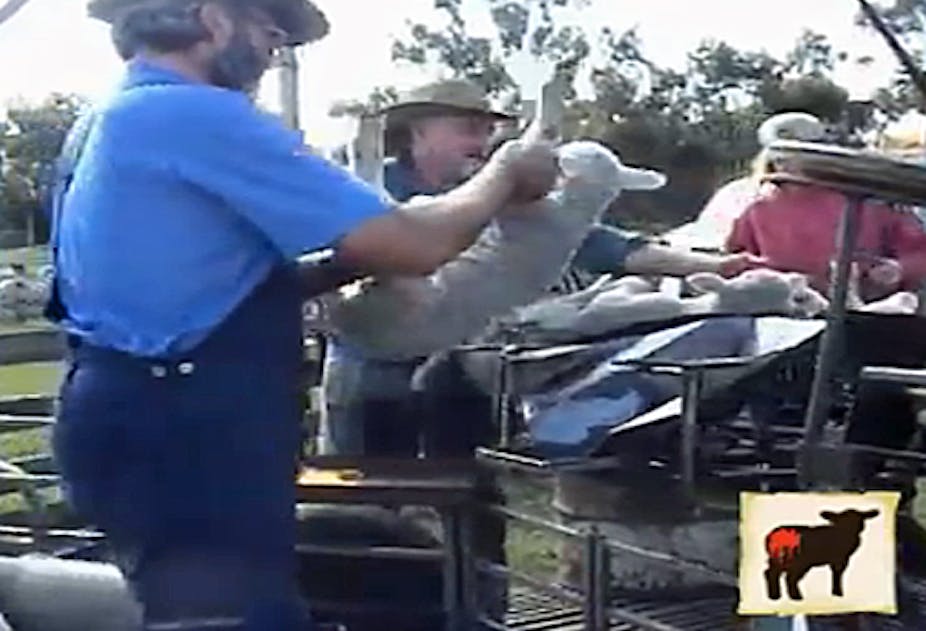Debate about the controversial practice of mulesing is set to be reignited again with prominent animal rights group, People for the Ethical Treatment of Animals (PETA) announcing a new campaign targeting the Australian wool industry.
Frustrated with the lack of progress on phasing out mulesing, the group is now targeting tourists visiting Australia with a confronting video of lambs being mulesed.
The campaign follows an aggressively fought out battle between PETA and the wool body, Australian Wool Innovation (AWI) which made international headlines last year and has led to a growing list of international retailers opting not to use wool from mulesed sheep.
Battle lines
Mulesing is a surgical procedure performed on-farm on lambs, usually between two and 12 weeks of age, to remove wool-bearing skin from the tail and breech area of sheep in order to prevent flystrike (cutaneous myiasis).
The furore around the practice goes back to 2004, when PETA threatened the Australian wool industry and major international clothing retailers with an international boycott of Australian wool if farmers continued to mules their sheep.
The AWI responded to these threats by committing to phasing out mulesing in 2010 - while simultaneously filing an application against PETA for allegedly contravening the Federal Trade Practices Act.
AWI eventually settled their case against PETA out of court in June 2007 when PETA agreed to a moratorium on activities against Australian woolgrowers until 31 December 2010. In return AWI agreed to fast-track alternatives to mulesing. Both AWI and PETA claimed victory as a result of the settlement of the case.
Despite the agreement reached between PETA and AWI in 2007, relations between these organisations have remained strained, with each side accusing the other of animal cruelty, misinformation and underhanded campaign tactics.
Market damage
Meanwhile, as the two sides continued to clash over mulesing, a number of international apparel retailers, including AB Lindex, Kukdong, Perry Ellis, Matalan, H&M, Adidas and Hugo Boss have stopped using wool from mulesed sheep in their products, suggesting that PETA’s campaign has done substantial damage to the market for Australian wool.
Despite the very real threats to the industry caused by the mulesing controversy, in 2009 AWI declared that the industry was unlikely to achieve agreed 2010 deadline to cease mulesing, instead stating that the industry would phase out the practice in its own time and would not be beholden to the demands of animal rights groups.
Failing to meet the agreed deadline to cease mulesing has significant implications for the future viability of the industry.
The US retail industry expressed their disappointment with AWI’s withdrawal from participation in the development of a renewed commitment to adopt alternatives to mulesing and expressed concerns around industry leadership of the mulesing issue.
Australian farmers have also expressed frustration with the slow pace change around developing viable alternatives to mulesing.
As the AWI continue to resist change, the list of retailers pledging not to buy wool from mulesed sheep has continued to grow including Gap Inc, Next and Liz Claiborne.
Most recently John Lewis, one of the UK’s largest retailers, stated that it would not stock products made with wool from mulesed sheep.
NZ advantage
Meanwhile, even as the Australian wool industry continues to fight PETA and other groups calling for a mulesing ban, the New Zealand Merino industry has taken a very different approach to addressing concerns about animal cruelty in wool production.
As early as 2007 the New Zealand industry declared that they were no longer mulesing Merino sheep and were receiving premiums for their wool for its non-mulesed status.
The New Zealand Merino Company launched the Zque label, an independent accreditation program that ensures environmental, social and economic sustainability of woolgrowers, animal welfare (non-mulesed) and traceability of the product back to the source.
The Zque label has been adopted by a number of premium performance wear brands such as SmartWool, Ibex, Aquascutum and Icebreaker who demand grower accreditation as part of their contracts.
As the battle lines are again drawn, the furore offers a compelling casestudy into how concerns for animal wellbeing can have a major impact on lifestock industries - a lesson other Australian industries would do well not to ignore.

